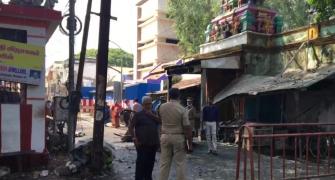The former US Ambassador to India Robert Blackwill has said that President George W Bush has been in awe of India since 1999 during his run for the presidency while being the Governor of Texas, and hence his commitment to a
strategic partnership between the US and India and the civilian nuclear deal runs deep.
At the time Bush was running for the presidency, Blackwill along with now Secretary of State Condoleezza Rice and several others who had worked in the administration of President George H W Bush (the current President's father),
comprised the foreign policy team known as the Vulcans who were put together by the latter to help educate his son about international affairs, a subject on which he was sorely lacking.
However, Blackwill recalled that then Governor Bush had developed 'a global approach to US-India relations consistent with the rise of India as a great power', and that 'when I asked then Governor Bush in Austin, Texas, in early 1999, about the reasons for his obvious and special interest in India, he immediately responded, 'A billion people in a functioning democracy. Isn't that something? Isn't that something?'"
The erstwhile envoy to New Delhi made these remarks after accepting the 2007 Bridge-Builder Award for his role in transforming US-India relations at a gala black-tie dinner banquet in Washington,DC at the exclusive Metropolitan
Club hosted by Bridging Nations a think tank founded by Dr Prakash Ambegaonkar, a high tech entrepreneur turned policy wonk.
Blackwill, in his acceptance remarks of 'how forward the relationship has come in the last six-and-a-half years', since he was appointed ambassador to India by Bush quoted from the first speech he gave in India on September 6, 2001, in Mumbai, where he had articulated Bush's policy toward India.
"Let me preface this by saying that I did not ask for State Department clearance of this speech, because they would not have done so, and indeed, I think none of it would have survived. But I knew this was expressing the President's view and conviction about the (US-India relationship)," he said.
Blackwill was intensely disliked by the career diplomats and also senior officials at the State Department, including then Secretary of State Colin Powell, because capitalizing on his friendship with the President and the access he enjoyed, he would regularly bypass the State Department and communicate directly with the White House and often with the President in terms of moving the US-India relationship sans some of the caution and policy guidance of those in Foggy Bottom.
Even though then Assistant Secretary of State for South Asian Affairs Christina Rocca was technically his boss and the one he was supposed to report to, Blackwill was extremely dismissive and disdainful of Rocca and the South Asia
bureau and would hardly communicate with them but with the National Security Council at the White House, where his former protégé Rice -- during the time they both served in the National Security Council of the senior President
Bush -- was National Security Adviser.
In his remarks, Blackwill spoke of how in his speech at the time, he had informed India of President Bush and his 'big idea about US-Indian relations', and that 'my President's big idea is that by working together more intensely than every before, the United States and India -- two vibrant democracies -- can transform fundamentally the very essence of our bilateral relationship and therefore make the world freer, more peaceful and more prosperous'.
And then he traced the genesis behind this big idea of President Bush, recalling his remark in 1999 describing India, Blackwill said that obviously when he made that first speech of his in Mumbai 'here (in Washington) they were having catatonic shocks in the State Department', because he had assured India and its people that 'in pursuing this accelerated US-India dialogue, America will not be a nagging nanny -- I know of no-one who likes one of those -- not among families, not among nations'.
He spoke of how he had said that thus, "The Bush Administration does not intend to lecture India on its national interests because my government does not presume to know India's national interests better than the democratically
elected representatives of this country."
Blackwill said he had argued that 'India's choices must remain India's choices. What the Bush presidency will do is treat this country with great respect. What we will due is speak to our Indian colleagues with honesty and candour
about Administration judgments regarding the policy alternatives considered by the Government of India for US-India relations, for the region and the world'.
The ex-ambassador, who is now president of the Washington lobbying firm of Barbour, Griffith and Rogers, which has the lobbying contract from the government of India worth $50,000 a month to push through the US-India civilian nuclear deal, was presented with the Bridge-Builder Award by Congressman Joe Wilson, South Carolina Republican, and co-chair of the Congressional Caucus on India and Indian Americans.
Wilson said, "Indeed, as we think about the relationship and the partnership -- the strategic alliance -- between the United States and India, as identified so clearly by Prime Minister Singh and President Bush, I would point out that
the person who has helped put all of this together is Ambassador Robert Blackwill."
Earlier, he was give a rousing introduction by Ashley Tellis, senior associate at the Carnegie Endowment for International Peace, who served under Blackwill as his senior strategic policy adviser at the US embassy in New Delhi, and then again for a short time -- after Blackwill returned to Washington -- under his former boss in the National Security Council where Blackwill was Deputy National Security Adviser for Strategic Planning, this time under Rice.
Tellis said, "It is indeed fitting that he (Blackwill) is the first recipient of the Bridging Nations Foundation's Bridge Builder Award."
"It one were to invite Aristotle to address this audience, he would probably have said that Robert Blackwill is the 'efficient cause' of the transformation of US-India relations."
Tellis mused that 'for a more pedestrian mind like myself, I have to be content with simply saying that he was the father of the new US-India global partnership'.






